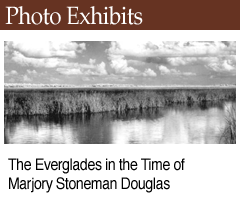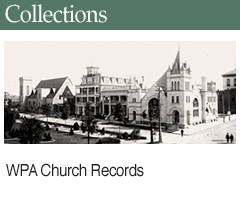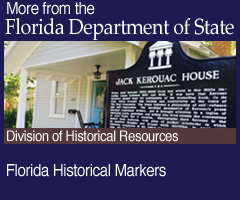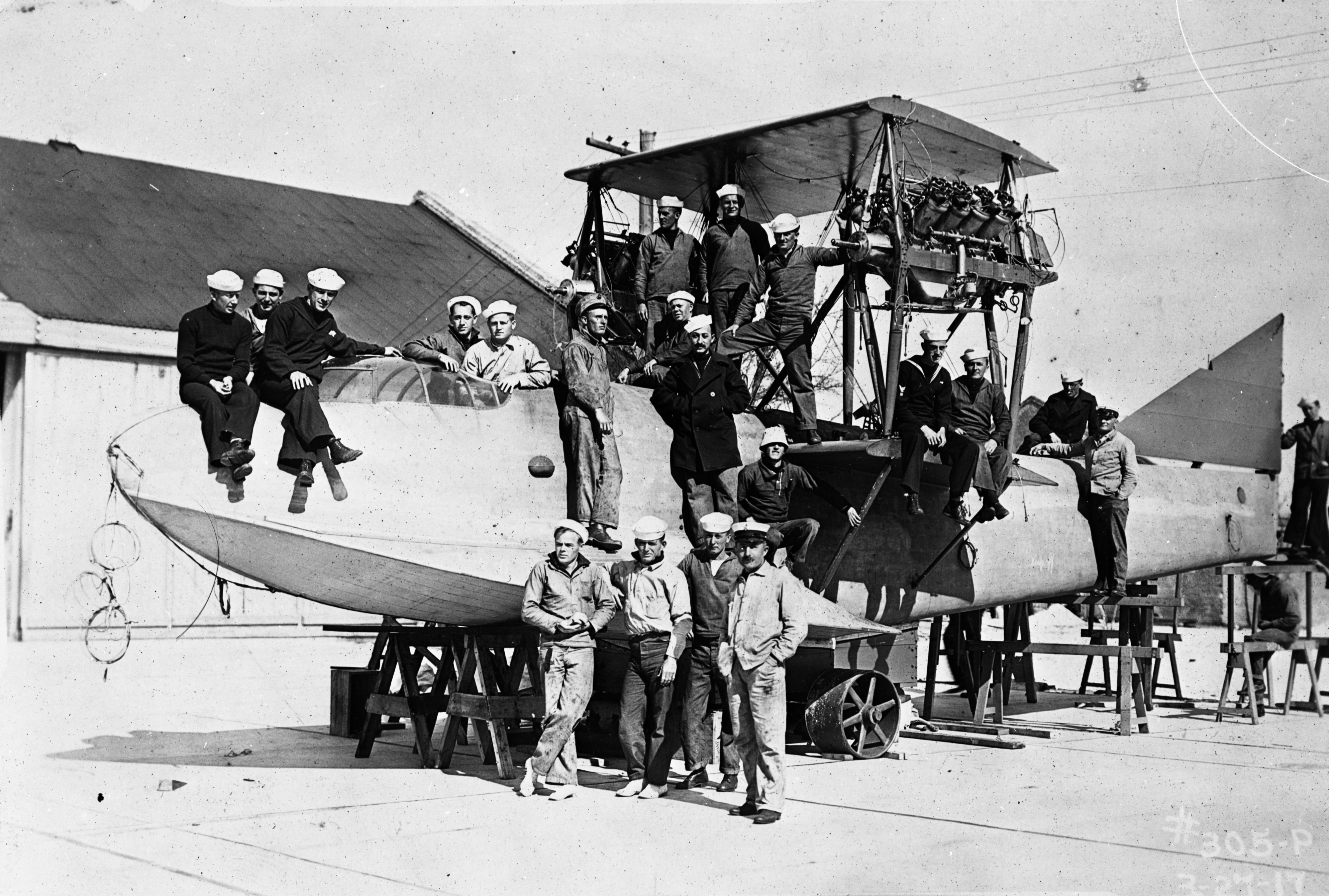A Guide to Researching the Territorial Era
at the State Archives of Florida
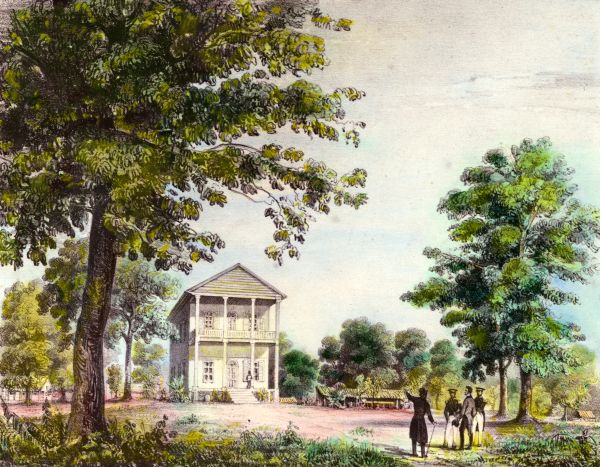
Banking & Commerce
As thousands of people moved into Florida during the Territorial Era, businesses of all kinds sprang up to meet their needs. Many of these businesses were general stores and mercantile outfits, equipped to serve the needs of consumers. Other corporations formed to handle the new territory's capital improvement needs - especially banking and transportation. This section contains collections relating to banking and commerce in territorial Florida, including store ledgers and other business records, as well as papers from one of Florida's earliest banks.
This guide provides the name and a description of each collection or series, plus its identification number, which is hyperlinked to its record in the Archives Online Catalog. Once inside the catalog record, you can access a list of the volumes, boxes or folders that make up the collection or series.
Series 1388: Indexes to Transportation and Utilities Charters, 1832-1901
This series contains listings of companies that provided goods or services connected with canals, gas, railroads, streetcars, steamships and telephone or telegraph lines from 1832 to 1901. These lists serve as indexes to the charters of these institutions.
The charters may be found in either the "Laws of Florida" or in "McClellan's Digest" by the citations that follow the entries. Most citations provide the year of charter issuance, although some do not. In those instances the key is found in the chapter number. Prior to 1957, the chapter numbers were sequential, and therefore a higher chapter number indicates a later date for the issuance, or amending, of a particular charter.
The series contains two volumes of handwritten indexes, a scrap of an index, and a partial typescript of an index from A through K.
Collection M83-28: Journal of the Iamonia Plantation, 1837-1873
The collection contains a microfilm copy of the Iamonia Plantation journal from 1837 to 1873. The journal is a daily record of the running of the plantation. There are entries by Charles Bannerman that give information on his farming methods through 1861. Also included in the journal is an account ledger of the plantation through the early 1870s. The last part of the journal contains practical information, including recipes and remedies; among this information are directions for curing bacon, curing sheep skins and preventing bedbugs.
Collection M84-20: Tallahassee Store Ledger, 1839
The collections contains a store ledger from a mercantile store in Tallahassee containing accounts for members of many old families of Tallahassee: Chaires, Randolph, DuVal, Moseley and Murat. Listed in the ledger are goods purchased and amount owed.
This is a particularly readable ledger from a merchant who sold a wide range of goods. The collection is an excellent tool for understanding the kinds of consumer goods available for purchase in the 1830s in territorial Florida.
Collection M84-21: Samuel S. Sibley Papers, 1837-1848
Colonel Samuel S. Sibley was the editor of the Floridian, a newspaper published in Tallahassee, Florida. Sibley bought the paper from William Wilson in 1837, and sold it to Charles E. Dyke in 1852.
The collection contains a book of subscribers to the Floridian newspaper kept by Samuel S. Sibley from 1837 to 1840. It also has a letter from Sibley to Judge J. W. Gilchrist, September 12, 1848, concerning a Democratic rally, which the writer fears will have a low turnout, especially in comparison to the Whig rally organized for the same time.
One valuable contribution of this collection is the perspective it provides on who was paying attention to Florida politics and development during the territorial era. Many of the subscribers were from outside of Florida.
Collection M88-34: William A. Bradley Collection, 1822-1884
This collection consists of 51 nineteenth century Florida documents that were collected by Mr. William Bradley. The documents relate primarily to legal and economic matters in Leon, Jefferson and Gadsden County and include the sale and shipment of cotton. Most of the materials date from the antebellum era, although several are from the post-Civil War period.
Collection M90-19: Union Bank of Florida Minutes, 1840-1852
The Union Bank of Florida was created in the early 1830s to provide capital to those "improving" the territory through planting. Along with the Banks of Pensacola and the Southern Life Insurance and Trust Company at St. Augustine, the Union Bank in Tallahassee sold territorial "faith bonds" for the much needed cash.
The Union Bank was beset by the troubles that attended the territory during that period, e.g. land fraud and Indian wars, and was never able to establish the widespread wealth that had been envisioned at its founding. By repudiating the debt created by the sale of its "faith bonds" and requiring the use of specie, the territorial legislature sounded the death knell of the Union Bank.
This series contains the minute book of the Union Bank of Florida at Tallahassee from 1840 to 1852. The minutes illustrate the board of directors' attempts to deal with the tumultuous events of this period as well as the mundane operations of the bank.
Collection M96-28: Miles Blake Mercantile Records, 1815-1827
This ledger documents the business activity of one of the earliest merchants in Tallahassee and Leon County, Florida. Most of the information is made up of account entries enumerating the types, quantity and cost of the goods purchased, as well as the debits and credits owed and paid by the different customers of the concern.
Collection M96-29: C.W. Fisher Records, 1828-1862
This book contains financial records of two different persons. The first to use it was an unknown doctor in Leon County, Florida. The accounts that are entered date from 1838 to 1841. The second user was C.W. Fisher, proprietor of the Planter's Hotel. He used it as a day book, keeping track of daily charges to customers, from 1858 to 1862.
Collection M96-30: Records of an Unknown Middle Florida Mercantile Business, 1828-1830
This ledger documents the business activity of a mercantile business in the Middle Florida area, likely Aspalaga in Gadsden County. Because the end pieces list the land holdings of Latinus and Marcus Armistead, it is possible that the store was theirs.
This ledger is one of the more detailed and clearly legible examples of mercantile records available in our collections.
Collection M97-3: N.M. Martin Mercantile Ledger, 1836-1841
This ledger contains the records of a merchant in the Tallahassee area. The entries contain information about the amount, cost and profit that was associated with the wholesale and retail of merchandise in the middle years of the Territory of Florida.
Collection N2005-9: Blackshear, Pittman, White, Dickens and Drew Family Papers, 1700s-1970s
This collection is made up of correspondence, personal papers, business papers, photographs and other miscellaneous materials of the Blackshear, Pittman, White, Dickens and Drew Families of Jackson County, Florida and Laurens County, Georgia. The collection provides unique documentation of business and family life in northwest Florida and southwest Georgia from the antebellum era through the mid-20th century.
Organized into multiple subseries:
Subseries 1: Correspondence, 1809-1970s. This series consists of personal correspondence, legal correspondence, and other related papers of the Blackshear, Pittman, White, Dickens, Drew and related families. The personal letters discuss a wide range of topics including family relations, genealogy, weather, health, food, travel, education and school, opinions about the Civil War, and family members military service
Subseries 2: Business Correspondence, 1822-1970s. This series consists of business correspondence and includes letters, receipts, promissory notes, bills of exchange, bills of lading, invoices, ledgers and account statements. The business correspondence includes details of the cotton and slave trade along the Apalachicola, Chipola and Chattahoochee Rivers, as well as banking transactions in middle and west Florida. Much of the correspondence documents the mercantile, farming, cotton and business interest of Thomas M. White, a wealthy businessman, banker, politician, and landowner in Jackson County. Also of interest are letters and documents pertaining to unpaid debts, land ownership, financial problems and running for political office.
Subseries 3: Frog Level Plantation Correspondence, 1850-1876. This series consists of letters between various family members of the Blackshear family at Frog Level Plantation in Laurens County, Georgia. Included are letters between Edward J. Blackshear, Mary Jane Pittman Blackshear (E.J. Blackshear's wife), Martha Pittman (Mary Jane Pittman's mother), Mary Blackshear (E.J. and Mary Jane's daughter) and other family members.
Subseries 4: Genealogical Materials, 1700s-1950s. This series consists of genealogical materials of the families contained in the collection. This includes the major families as well as related families. Among the families discussed are the Blackshear, Bryan, Bugg, Dickens, Drew, Milton, Pittman, Smith, and White families. There are several genealogy charts of interest which help to detail the various family lineages.
Subseries 5: Photographs, 1850s-1950s. This series consists of photographs from two albums. The photographs are of the Blackshear, Dickens, Estes, Pittman, White and related families. While some of the photographs were labeled, many of the photographs are unidentified.
Subseries 6: Miscellaneous Materials, 1820s-1970s. This series includes newspapers, newspaper clippings, pamphlets, poems, sewing patterns, speeches, reports, land records, plat maps, church newsletters, a family bible, the book "Marse Ned: the Story of an Old Southern Family" and related materials, and John D. Pittman's autograph book from the University of Virginia.
The autograph book is of special interest. Dated 1861, the autograph book contains illustrations from the university campus, a brief history of the university, lists of professors and benefactors, illustrations of professors, and entries addressed to John D. Pittman by fellow students. All of the entries were written in April 1861, only a few days after the beginning of the Civil War. The entries by fellow students express their friendship for Pittman and, in many cases, comment on the unfolding war. A photocopy of the student entries from the autograph book as well as a typewritten transcript of the entries are included in this series. Due to the fragile condition of the autograph book, research access to the book is restricted to the photocopy and transcript.

 Listen: The Bluegrass & Old-Time Program
Listen: The Bluegrass & Old-Time Program